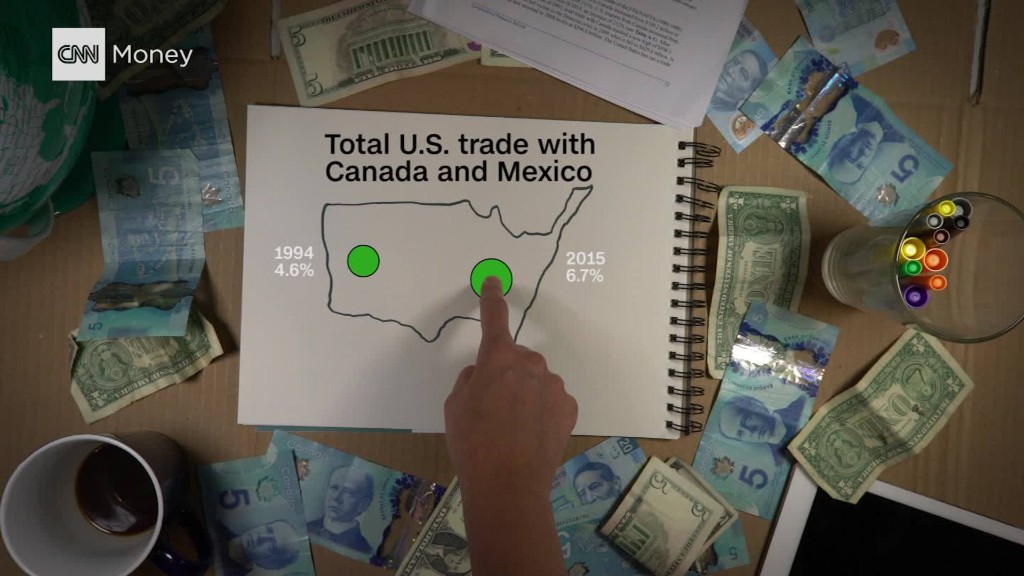
President Trump calls it the worst trade agreement in American history.
Now he wants to fulfill one of his core campaign promises: to make better deal for American workers.
The Trump administration will begin to renegotiate NAFTA on Wednesday with counterparts from Mexico and Canada. The first round of talks kick off in Washington, D.C.
Trump's verbal punching bag
Trump blames NAFTA for millions of lost jobs and thousands of shuttered factories in America. Nonpartisan congressional research concluded in 2015 that NAFTA didn't cause a jobs exodus.
About 14 million American jobs depend on trade with Canada and Mexico, according to the U.S. Chamber of Commerce, a business advocacy group.
But roughly 800,000 jobs were lost to Mexico between 1997 and 2013, to the Economic Policy Institute, a research group.
Related: Remember NAFTA? Talks are coming soon
NAFTA has been one of Trump's favorite punching bags. He lambasted NAFTA and Mexico throughout his presidential campaign, and threatened to slap tariffs on Mexican goods or tax American companies that move jobs south of the border.
In January, Trump briefly flirted with the idea of a 20% tariff on all Mexican exports to the United States. He also once threatened to withdraw from NAFTA.
Trump even credited his tough talk on NAFTA with getting him to the White House. Trump voters have told CNNMoney they voted for him in part to see him renegotiate better deals.
It's not clear how exactly Trump plans to get that better deal. But when U.S. Trade Representative Robert Lighthizer outlined the administration's NAFTA objectives in July, he included a top goal: reduce the U.S. trade deficit with Mexico, which last year hit $63 billion.
The top challenge for NAFTA
Trump's ultimate aim is to increase the number of American factory jobs. One possible way to do that is to force companies to produce more parts in the United States.
There is a key part of NAFTA known as "rules of origin." It means a certain percentage of parts in a product, such as a car, have to originate from North America.
For example, 62% of the parts in a car sold in either Mexico, Canada or the United States must come from there. The Trump administration has hinted it could raise that percentage and that it plans to more strictly enforce the standards for rules of origin.
Related: Renegotiating NAFTA -- in 15 easy steps
However, trade experts caution that forcing more parts to be made in America could mean car prices go up.
Here is Trump's top challenge for NAFTA: broker a deal that creates more manufacturing jobs but doesn't force Americans to pay more. Experts say he'll be hard pressed to accomplish both tasks.
A looming contradiction
Trump's team also runs the risk of contradicting a trade deal Trump bashed. Experts say his administration's list of NAFTA objectives is nearly identical to key parts of the Trans-Pacific Partnership, or TPP. Trump withdrew from that deal before it became law.
But U.S. Commerce Secretary Wilbur Ross says TPP's sections on labor and environmental standards are a "starting point" for NAFTA negotiations with Mexico and Canada.
Trump promised Americans he would bring together the best negotiators to get a new deal. He appointed Ross, Lighthizer, National Economic Council Director Gary Cohn, and White House trade adviser Peter Navarro to lead on trade policy.
Lighthizer tapped John Melle, a career USTR official who was not nominated by Trump, to lead the talks. Melle was on the original USTR staff in 1993 that helped get the deal across the finish line in Congress. NAFTA became law in 1994.
A tight deadline
Time to renegotiate NAFTA is short.
Wednesday is the first day the United States is legally allowed to begin talks after checking off a lengthy list of requirements under American law.
Mexican officials say they want a deal done by the end of the year. Mexico has presidential elections next year and Mexican President Enrique Peña Nieto can't run again due to term limits.
Related: Spurned by Trump, China and Mexico talk up trade deal
Andres Manuel Lopez Obrador, the leading presidential candidate, promised voters he would get tough on trade with the United States. Mexican officials say getting a trade deal approved during Mexico's campaign season would be difficult.
NAFTA took years to negotiate. Trade experts say negotiating a new and significantly different deal in five months -- August to December -- is wishful thinking.


